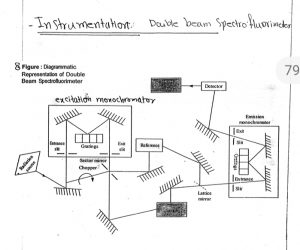Instrumentation of Fluorimetry and MCQ Asked in Previous Exams
INSTRUMENTATION OF Fluorimetry
1. Source of light:
In Fluorimetry there are mainly three types of lamps are used
A. Mercury vapour lamp :-
At high pressure Mercury lamp give 350 nm to 734 nm region radiation.
At low pressure Mercury vapour give addition line at 254 nm is used as source in filter type of Fluorimetry.
B. Xenon arc lamp :- It give a more intensity radiation when compared to Mercury lamp.
C. Tungsten lamp :- when molecule are excited in visible region tungsten lamp are used.
2. Filter and monochromator
In Fluorimetry there are mainly two filter are present
1. Primary filter :– absorbed visible radiation and transmit uv radiation.
2. Secondary filter :– absorbed uv radiation and transmit visible radiation.
Mainly two monochromator are used in flourimetry.
1. Excitation monochromator :– provide a suitable radiation for excited of molecule.
2. Emission monochromator :– Isolates only the radiation emitted by the flourescent molecule.
3. Sample cell : sample cell are cylindrical or quadrangular shape. The cell are made up of colour corrected fused glass and pathlength is normally 10 mm or 1 cm.
4. Detector :-
Mainly photovoltaic cell, Photo multiplier tubes , Photo tube are used as detector.
Photo multiplier tubes are the best and accurate.
5. Instruments
- A. Single beam fluorimeter
- B. Double beam fluorimeter
- C. Spectroflourimeter
Here we discussed Double beam Fluorimetry

Working of double beam Fluorimetry:-
- The excitation radiation which are produced by the 150W xenon lamp are chopped by the radiation fall on excitation monochromator.
- A sector mirror is present after the exit slit of excitation monochromator.
- During first rotation of chopper, sector mirror reflect the beam to reference cell. During second rotation of the chopper sector mirror open and radiation fall on sample cell.
- Generally the radiation emitted from the sample cell and reference cell are focused one after the other on the entrance slit of emission monochromator or from front surface mirror.
- Reference and sample beam are focused on photomultiplier tube by passing through exit slit of emission monochromator.
- Thus, the signal from photomultiplier tube is measured in a photometer and recorder using suitable readout system.
MCQ
1. When molecules are excited in visible region which lamp is used ?
A. Hydrogen deturium lamp
B. Xenon lamp
C. Tangustan lamp
C. Mercury lamp
Ans. B
2. Which filter are absorbed UV radiation and transmit visible radiation ?
A. Primary filter
B. Secondary filter
C. A and B
D. None of this
Ans. B
3. Which filter are absorbed visible radiation and transmit UV radiation ?
A. Primary filter
B. Secondary filter
C. A and B
D. All of the above
Ans. A
4. At low pressure Mercury lamp liner radiation wavelength is ?
A. 254 nm
B. 700 nm
C. 800 nm
D. 600 nm
Ans. A
5. Sample cell shape is
A. Cylindrical
B. Quadrangular
C. A and B
D. None of this
Ans. C
6. How many mm path length is sample cell ?
A. 10 mm
B. 20 mm
C. 30 mm
D. 40 mm
Ans.A
7. During first rotation of chopper radiation beam is transmit through ?
A. Sample cell
B. Reference cell
C. A and B
D. None of this
Ans. B
8. During second rotation of chopper radiation beam is transmit through ?
A. Sample cell
B. Reference cell
C. A and B
D. None of this
Ans. A
9. Which detector are used in Fluorimetry?.
A. Photo voltaic cell
B. PMT
C. Photo tube
D. All of the above
Ans. D
10. Which are the varient of Fluorimetry instrument ?
A. Single beam
B. Double beam
C. Spectroflourimeter
D. All of the above
Ans. D
Reference: book of pharmaceutical analysis of the third edition of the Dr. S. Ravisankar
Page no. 3.10 t to 3.13
Reference: take the book of organic SPECTROSCOPY Y R Sharma.